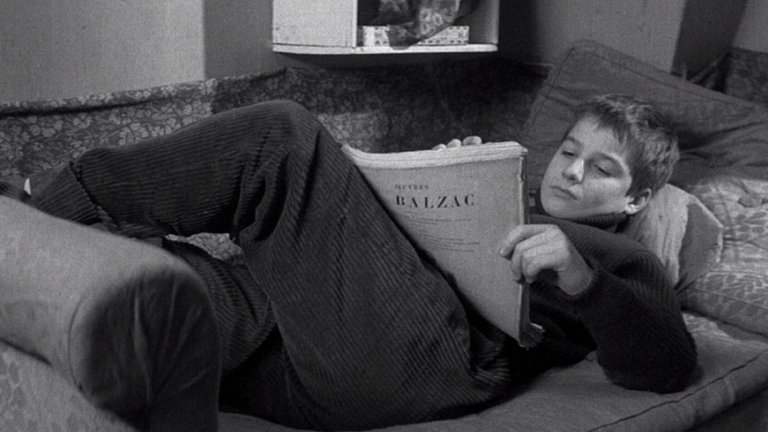Film Review: The 400 Blows (Les Quatre Cents Coups, 1959)

If one aspires to create a truly monumental film, it is often beneficial for that film to possess a personal touch. Few films exemplify this notion as profoundly as François Truffaut's celebrated directorial debut, The 400 Blows (1959), a semi-autobiographical coming-of-age drama that not only catapulted him into the limelight of French and global cinema but also marked the inception of the French New Wave movement.
The title The 400 Blows translates from a French idiom meaning "to raise hell," aptly reflecting the chaotic life of its protagonist, Antoine Doinel, portrayed by Jean-Pierre Léaud. Antoine, considered Truffaut’s alter ego, is a Parisian boy whose rebellious nature and series of unfortunate mishaps lead him into constant disciplinary trouble at school. His home life offers little respite; his mother, Gilberte (Claire Maurier), views both Antoine and family life as burdensome. Although his stepfather, Julien (Albert Rémy), appears more sympathetic, he remains overly focused on work. This combination of neglect and misunderstanding creates a rift between Antoine and his parents, ultimately driving him to run away from home. This desperate bid for freedom leads to delinquency and lands him in a juvenile reform school.
While the French New Wave is often heralded as a revolutionary cinematic movement, The 400 Blows, particularly when viewed through a contemporary lens, presents itself as somewhat conventional. It appears almost as a compromise between traditional filmmaking and the emerging avant-garde techniques of the era. This duality is evident in its visual style, which marries the expansive 2:35 widescreen format—typically reserved for grand epics—with black-and-white cinematography by Henri Decaë, more commonly associated with intimate chamber dramas.
The widescreen format ultimately enhances The 400 Blows, allowing the Parisian exteriors to appear grand and imposing while simultaneously making the young protagonist seem diminutive in comparison. This visual choice effectively signals Antoine's inferior and precarious position within society. Truffaut employs this format to experiment with contrasting styles throughout the film; he juxtaposes handheld camera work and almost documentary-like shots of Parisian streets—where Antoine experiences fleeting moments of freedom—with the oppressive claustrophobia of interiors such as the classroom or his cramped family apartment.
This stylistic approach works harmoniously with the film's vignette-like structure, which nevertheless conveys a clear and coherent narrative arc. Much credit for this achievement goes to Truffaut’s masterful direction and to Léaud’s performance as Antoine. At just 14 years old, Léaud delivers an astonishingly nuanced portrayal that impressed Truffaut so much that he allowed the young actor to improvise some of his lines, despite adhering to the principles of Author Theory.
The supporting cast also delivers commendable performances; however, it is often the adult characters—such as Rémy’s stepfather Julien, Maurier’s mother Gilberte and Guy Decomble’s tyrannical teacher Sourpuss—who leave a more lasting impression than their younger counterparts. Adding depth to this poignant narrative is Jean Constantin's melancholic musical theme, which permeates the film's atmosphere.
A decade after its release, The 400 Blows gained recognition for its revolutionary credentials, particularly in light of the social upheaval and generational conflict characterising the 1960s. The Baby Boomer generation—represented by Antoine—rebelled against established norms and authority figures. Yet Truffaut's inspiration stemmed not only from his own experiences as an unwanted child and petty delinquent but also from previous filmmakers' works. Notably, Jean Vigo's seminal film Zero for Conduct served as an evident template for several scenes within The 400 Blows, illustrating how cinematic history informs new narratives.
Regardless of its initial reception or stylistic choices, The 400 Blows struck a chord with French audiences upon its release, becoming Truffaut's most commercially successful film. This success was mirrored by critical acclaim; Truffaut solidified his status as a master filmmaker by winning the Best Director Award at the Cannes Film Festival.
Following The 400 Blows, Truffaut continued to create renowned films that further explored themes introduced in his debut. He chose to expand upon Antoine Doinel's story in subsequent films featuring Léaud in the titular role, culminating with Love on the Run in 1979.
François Truffaut’s The 400 Blows remains a seminal work that encapsulates not only personal experiences but also broader societal themes relevant across generations. Its innovative approach to storytelling and cinematography paved the way for future filmmakers while providing an unflinching look at youth disenfranchisement.
RATING: 8/10 (+++)
Blog in Croatian https://draxblog.com
Blog in English https://draxreview.wordpress.com/
InLeo blog https://inleo.io/@drax.leo
Hiveonboard: https://hiveonboard.com?ref=drax
Rising Star game: https://www.risingstargame.com?referrer=drax
1Inch: https://1inch.exchange/#/r/0x83823d8CCB74F828148258BB4457642124b1328e
BTC donations: 1EWxiMiP6iiG9rger3NuUSd6HByaxQWafG
ETH donations: 0xB305F144323b99e6f8b1d66f5D7DE78B498C32A7
BCH donations: qpvxw0jax79lhmvlgcldkzpqanf03r9cjv8y6gtmk9